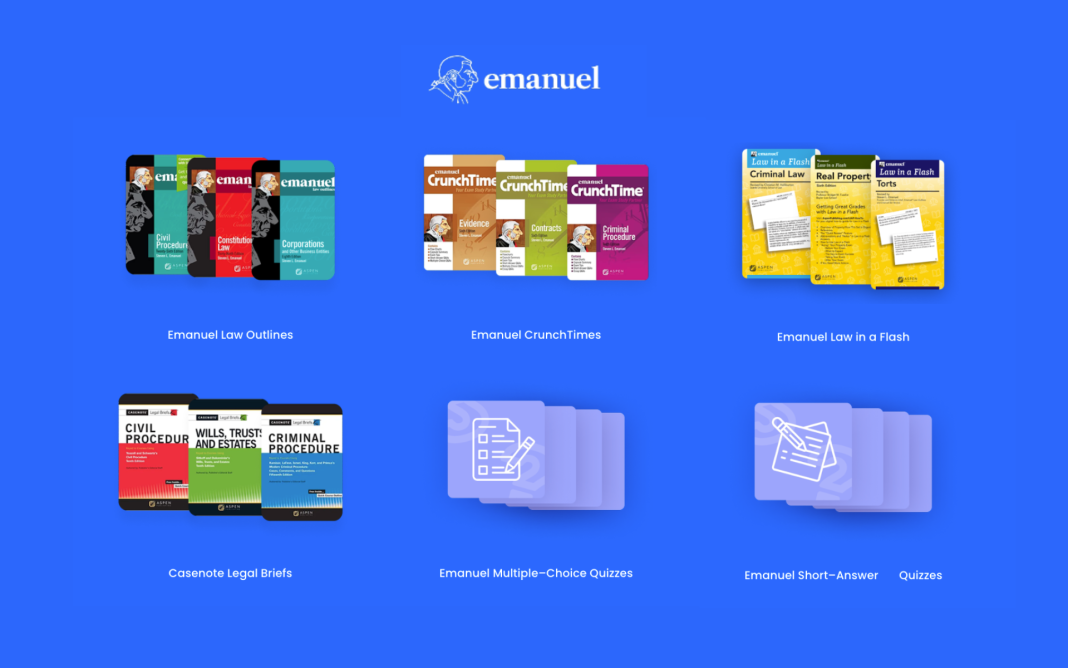Steven Emanuel was frustrated.
As a first-year law student at Harvard Law School, he was struggling with the teaching style of a visiting Civil Procedure professor. While his classmates hammered away at the material, he decided to take matters into his own hands and outline the course.
He hired a few classmates to fill in the missing pieces and then turned to his father, a Harvard Law graduate with a printing company, to print 150 copies of his work. Outside the law school’s dining hall, he sat at a table and sold them for $8 dollars each, and 115 of the 130 students in his first-year section bought the outline.
That was 1974; today the Emanuel Law Outlines series is the number one study aid in legal education, and Steven is still the brain behind the title.
“What I take the most pride and pleasure in is being in some sense an encyclopedist and covering, in considerable detail, what I think every law student would want to know about the 9 or 10 most important subjects or areas of the law,” Emanuel said. “I’m not a super expert in any of them, but I know a pretty fair amount about each. I think I could do a competent job of teaching in any of them, given some chance to prepare.”

Emanuel was referred to as “The prophet of law school” in a 1982 article. He wrote all of his outlines then, as he does now — with the help of others from time to time.
“It’s the breadth of my coverage and the uniformity of my approach and the zillions of examples and questions that I’ve come up with that in the aggregate, are what I’m most proud of contributing to legal education,” he said.
Emanuel grew his empire beyond outlines, by adding the CrunchTime series and the Law in a Flash series of legal flashcards. He and Aspen, the company that bought his business in 2001, have sold more than 3 million units of his works. Today each Emanuel Law Outline sells for $45 to $60. (The $8 cost from 1974 is the equivalent of $51.65 today when adjusted for inflation).
While physical copies of his works are still available, Emanuel recently introduced EmanuelAYCE, (short for “All You Can Eat”). AYCE is an online subscription-based service that gives students unlimited access to the full text of all of the Emanuel Law Outlines, CrunchTimes, and Law in a Flash flashcards he writes or edits.
The subscription also includes over 40 titles in the Casenote Legal Briefs series, and over 3,000 short-answer and multiple-choice questions written by Steve and others. An AYCE subscription costs as little as $78 for six months or $120 for a year. That’s less than it would cost for two to three study aids, potentially giving students a big savings, since most law students take ten classes a year. And it piggybacks on one of the biggest trends in business — subscription-based services with monthly auto-renew charges.
If a student prefers to pay month-by-month, they can subscribe to EmanuelAYCE for $19 a month.
In addition to cost savings, the online format also makes it easier for students to search the full text of the whole collection, copy-and-paste materials into their own outlines, print the materials, quiz themselves topic-by-topic, review and re-take those quiz questions they got wrong, and track their overall progress throughout the semester.
Titles in the Emanuel Law Outlines and CrunchTime series that are included in the service are Civil Procedure, Constitutional Law, Contracts, Corporations, Criminal Law, Criminal Procedure, Evidence, Property and Torts. The Law in a Flash flashcard titles in the service includes those subjects, plus Federal Income Taxation, Professional Responsibility and Wills & Trusts.
The 3,000+ short-answer and multiple-choice questions include over 500 in a Multistate Bar Exam-style multiple-choice format.
Emanuel said the service is designed for students to use throughout their law school career.
“Law school and especially the exams in law school, are high stakes,” said Michael Gregory, who used to work for Aspen on the Emanuel study aids and now works closely with Steven Emanuel on various law-school-related projects. “Sometimes you only get that once-in-a-semester exam as an opportunity to get a good grade, or else to fail or come out anywhere in between.”
“You’ve got to get your hands around the content.” he continued. “You’ve got to be able to prepare for class, and especially … to get ready for the exams. There’s a variety of different paths you can take, and there’s a lot of stuff online. So you can figure ‘I’ll take my chances’ or I can go with something trusted.”
Emanuel is not done innovating. He and his team are working on an artificial intelligence system that will grade essays and help students study.

